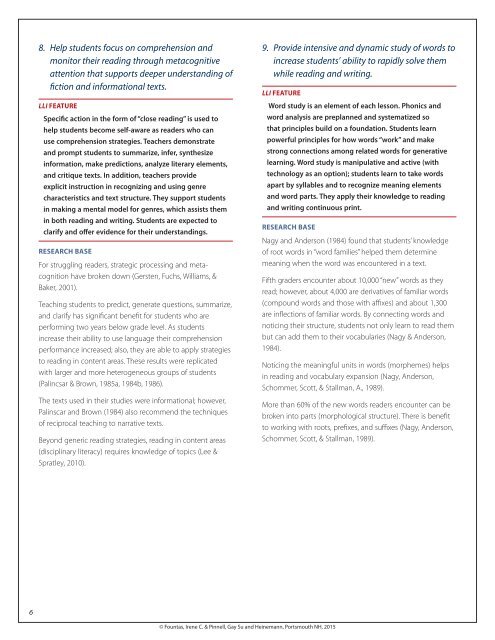Leveled Literacy Intervention
LLI_3_8_ResearchBase
LLI_3_8_ResearchBase
You also want an ePaper? Increase the reach of your titles
YUMPU automatically turns print PDFs into web optimized ePapers that Google loves.
8. Help students focus on comprehension and<br />
monitor their reading through metacognitive<br />
attention that supports deeper understanding of<br />
fiction and informational texts.<br />
LLI FEATURE<br />
Specific action in the form of “close reading” is used to<br />
help students become self-aware as readers who can<br />
use comprehension strategies. Teachers demonstrate<br />
and prompt students to summarize, infer, synthesize<br />
information, make predictions, analyze literary elements,<br />
and critique texts. In addition, teachers provide<br />
explicit instruction in recognizing and using genre<br />
characteristics and text structure. They support students<br />
in making a mental model for genres, which assists them<br />
in both reading and writing. Students are expected to<br />
clarify and offer evidence for their understandings.<br />
RESEARCH BASE<br />
For struggling readers, strategic processing and metacognition<br />
have broken down (Gersten, Fuchs, Williams, &<br />
Baker, 2001).<br />
Teaching students to predict, generate questions, summarize,<br />
and clarify has significant benefit for students who are<br />
performing two years below grade level. As students<br />
increase their ability to use language their comprehension<br />
performance increased; also, they are able to apply strategies<br />
to reading in content areas. These results were replicated<br />
with larger and more heterogeneous groups of students<br />
(Palincsar & Brown, 1985a, 1984b, 1986).<br />
The texts used in their studies were informational; however,<br />
Palinscar and Brown (1984) also recommend the techniques<br />
of reciprocal teaching to narrative texts.<br />
Beyond generic reading strategies, reading in content areas<br />
(disciplinary literacy) requires knowledge of topics (Lee &<br />
Spratley, 2010).<br />
9. Provide intensive and dynamic study of words to<br />
increase students’ ability to rapidly solve them<br />
while reading and writing.<br />
LLI FEATURE<br />
Word study is an element of each lesson. Phonics and<br />
word analysis are preplanned and systematized so<br />
that principles build on a foundation. Students learn<br />
powerful principles for how words “work” and make<br />
strong connections among related words for generative<br />
learning. Word study is manipulative and active (with<br />
technology as an option); students learn to take words<br />
apart by syllables and to recognize meaning elements<br />
and word parts. They apply their knowledge to reading<br />
and writing continuous print.<br />
RESEARCH BASE<br />
Nagy and Anderson (1984) found that students’ knowledge<br />
of root words in “word families” helped them determine<br />
meaning when the word was encountered in a text.<br />
Fifth graders encounter about 10,000 “new” words as they<br />
read; however, about 4,000 are derivatives of familiar words<br />
(compound words and those with affixes) and about 1,300<br />
are inflections of familiar words. By connecting words and<br />
noticing their structure, students not only learn to read them<br />
but can add them to their vocabularies (Nagy & Anderson,<br />
1984).<br />
Noticing the meaningful units in words (morphemes) helps<br />
in reading and vocabulary expansion (Nagy, Anderson,<br />
Schommer, Scott, & Stallman, A., 1989).<br />
More than 60% of the new words readers encounter can be<br />
broken into parts (morphological structure). There is benefit<br />
to working with roots, prefixes, and suffixes (Nagy, Anderson,<br />
Schommer, Scott, & Stallman, 1989).<br />
6<br />
© Fountas, Irene C. & Pinnell, Gay Su and Heinemann, Portsmouth NH, 2015


